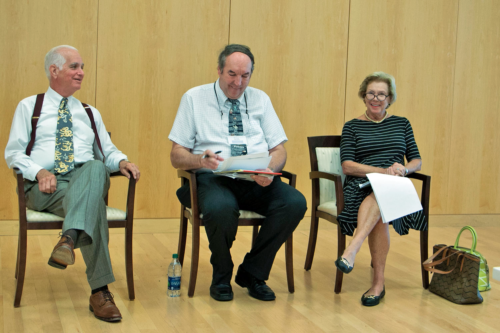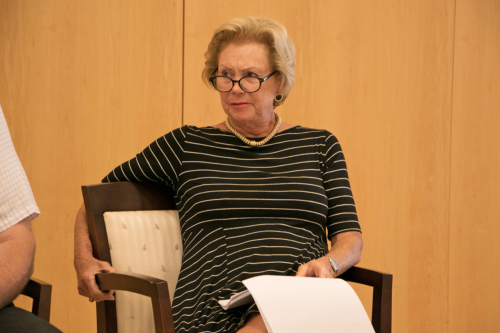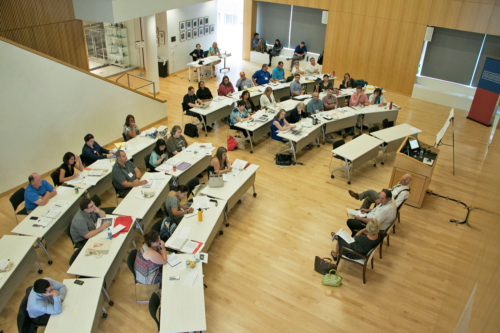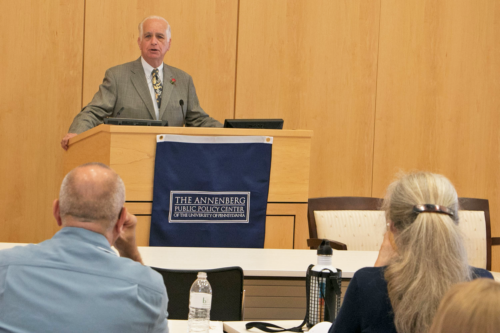The 2017 Constitutional Scholars Institute, conducted by the Rendell Center for Civics & Civic Engagement, brought nearly three dozen teachers from elementary school through high school to Philadelphia in the final week of July. The theme of this year’s institute, sponsored jointly by the Rendell Center, the Annenberg Public Policy Center (APPC), and the National Constitution Center, focused on the workings and evolution of the Supreme Court.
Over the course of the week, the teachers attended classes at the National Constitution Center and APPC on the history of the Supreme Court, different philosophies on interpreting the Constitution, in-depth analyses of specific amendments and Supreme Court cases, how individual justices interpret and decide cases, and more. They conducted a mock Supreme Court hearing at the federal courthouse and heard from a panel of federal judges on judicial independence. They also heard from scholars of politics, law, and history, and worked with a curriculum specialist on ways to integrate what they learned into their classrooms.
On Thursday, the group came to APPC for the day for sessions led by F. Graham Lee, Bruce Murphy, and Judge Marjorie O. Rendell, co-founder of the Rendell Center. After lunch, Lee, Murphy, and Rendell involved the group in a discussion of some of the issues recently or soon to be considered by the Supreme Court, including the travel ban (International Refugee Assistance Project v. Trump) and the case of a cake baker in Colorado who refused to make a wedding cake for a gay couple (Masterpiece Cakeshop v. Colorado Civil Rights Commission).
The group discussed different ways a judge could analyze the cases, the importance of looking at all sides of the case and using precedents to make an informed decision, as well as how the potential outcome could change if key details of the cases were different. Among other points, Judge Rendell talked about the difficulties of coming to a decision in complicated cases where the law is not clear and the ruling ends up coming down to “common sense” and the judge’s perception, and noted how important it is to have a strong record, since it can make or break a case.
Speakers at this year’s institute included:
- Akhil Reed Amar, professor of law and political science, Yale University
- Sally Flaherty, Social Studies Content Advisor, Pennsylvania Department of Education
- Michael Gerhardt, professor of Constitutional Law at UNC Law School, Scholar in Residence at the National Constitution Center, and Visiting Professor at the University of Pennsylvania Law School
- Francis Graham Lee, professor emeritus of political science at Saint Joseph’s University
- Ellen Iwamoto, Annenberg Public Policy Center, Civics Renewal Network
- Bruce Allen Murphy, judicial biographer, scholar of American Constitutional law and politics, and professor of civil rights at Lafayette College
- Judge Marjorie O. Rendell, Judge of the United States Court of Appeals for the Third Circuit
- Ed Rendell, former Pennsylvania governor and Philadelphia mayor, and co-founder of the Rendell Center
- Helena Silverstein, professor and department head in government and law at Lafayette College
- Michael A. Smerconish, host of The Michael Smerconish Program on SiriusXM and “Smerconish” on CNN, newspaper columnist, and author
- David Keller Trevaskis, Esq., attorney and former third-grade teacher with a Master’s Degree in Education
- Keith Whittington, professor of politics at Princeton University






